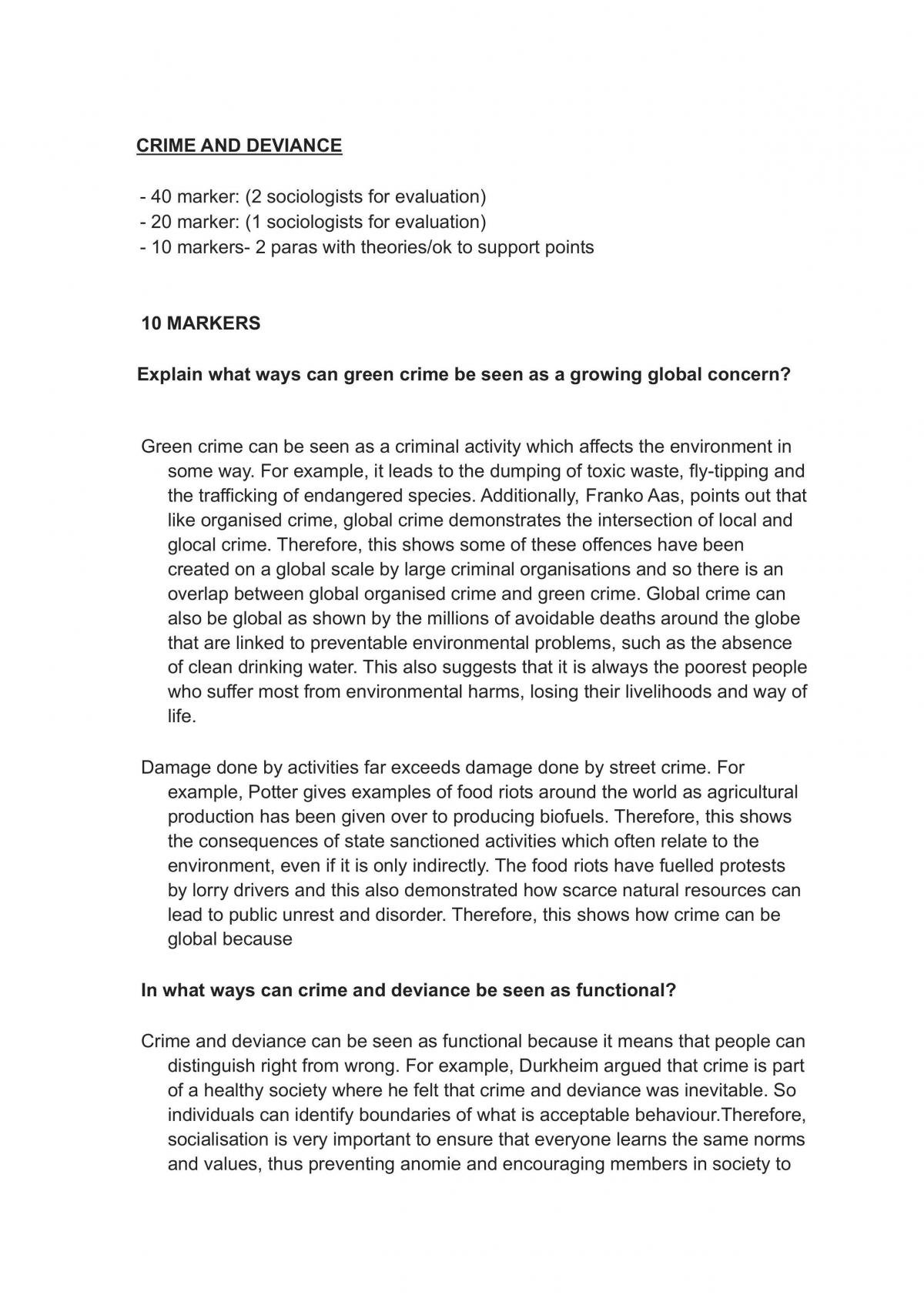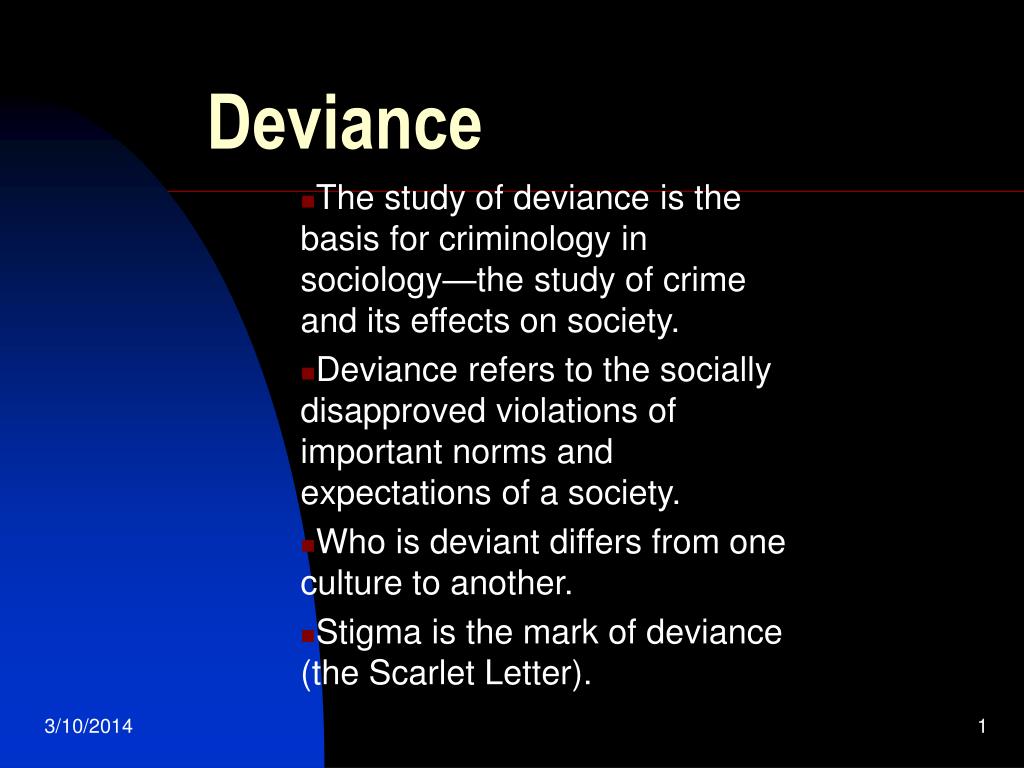Have you ever felt like you were on the outside looking in? Maybe you dressed differently, had different opinions, or pursued interests that seemed out of the ordinary? Perhaps you witnessed someone’s behavior that shocked you, making you question whether it was “normal.” This feeling of being different, of being on the fringe, is a common human experience. It can spark curiosity, confusion, and even judgment. But what truly defines deviance? And how do we navigate this multifaceted social concept in our daily lives?

Image: www.thinkswap.com
Deviance is a powerful concept that sheds light on the intricate workings of our society. It refers to any behavior, belief, or condition that violates the norms of a particular group or society. From minor social transgressions to serious crimes, deviance is a spectrum, and its boundaries can shift depending on the culture, context, and time period. This article will explore the fascinating world of deviance, examining its historical roots, theoretical frameworks, and real-world implications.
Understanding Deviance Through the Ages:
The study of deviance has a rich history, tracing back to the ancient Greeks, who recognized that moral behavior was crucial for a well-ordered society. During the Enlightenment, philosophers like John Locke and Jean-Jacques Rousseau argued that deviance arose from social inequality and oppression. These early thinkers laid the foundation for modern sociological theories of deviance, which examine the interplay between social structures, individual agency, and the formation of social norms.
Theories of Deviance: Making Sense of the Outliers
Over the years, sociologists and criminologists have developed diverse theories to explain why people engage in deviant behavior. Let’s explore some of the most influential perspectives:
1. The Functionalist Perspective: Deviance as a Social Glue
Functionalist theory, championed by sociologists like Emile Durkheim and Robert Merton, views deviance as a necessary element of any society. It argues that by defining what is considered deviant, a community strengthens its collective moral code and fosters social solidarity. For instance, when someone breaks a law, the punishment serves as a warning to others, reinforcing societal norms and maintaining order.

Image: amazonia.fiocruz.br
2. The Conflict Theory: Deviance as a Symptom of Inequality
Conflict theory, inspired by thinkers like Karl Marx, posits that deviance is a product of power struggles and social inequalities. It suggests that those in positions of power define what is considered deviant, often to maintain their dominance and control. This theory often explains why certain groups are disproportionately labeled as deviant, such as people of color, marginalized communities, and those with low socioeconomic status.
3. The Symbolic Interactionist Perspective: Deviance as a Social Construct
Symbolic interactionism, a micro-level approach, emphasizes the role of social interaction in shaping behavior, including deviance. It argues that deviance is not inherent in any act but rather determined by the social context and how individuals interpret and react to it. This theory emphasizes that labels and social reactions significantly influence how people perceive and engage in deviant behavior.
Deviance in Everyday Life: From Social Norms to Criminal Acts
Deviance manifests itself in countless ways, ranging from minor rule violations to major social transgressions. Here are some common examples:
- Fashion and Appearance: Wearing clothing considered eccentric or inappropriate for a particular setting can be considered deviant.
- Social Etiquette: Breaking social norms like interrupting conversations, using offensive language, or failing to say “please” and “thank you” can be perceived as deviant.
- Drug Use and Addiction: Substance abuse is often considered deviant, depending on the substances and cultural contexts.
- Criminal Acts: Violating laws, including theft, assault, and murder, are considered egregious forms of deviance.
Consequences of Deviance: The Ripple Effects
The consequences of deviance can vary greatly depending on the specific act, the social context, and the response of others. Some potential consequences include:
- Social Stigma: Being labeled as deviant can lead to social ostracism, isolation, and discrimination.
- Legal Penalties: Criminal acts often result in fines, imprisonment, or other legal sanctions.
- Psychological Distress: Individuals who engage in deviant behavior may experience guilt, shame, and anxiety.
- Social Change: Deviance can sometimes spark social reform and challenge existing norms, leading to positive social change.
Navigating Deviance: A Call for Empathy and Understanding
While deviance can be a source of discomfort and conflict, it is crucial to approach it with empathy and understanding. Remember that every person has their own unique story, background, and motivations.
It is essential to avoid jumping to conclusions or making judgments based on superficial appearances or limited information. Instead, we should strive to understand the complexities of human behavior and recognize that those who engage in deviant behavior may be struggling with personal challenges, social injustices, or mental health issues.
What Deviance
Moving Forward: Cultivating a More Inclusive Society
By embracing a nuanced understanding of deviance, we can move toward a more inclusive and understanding society. We can challenge harmful stereotypes, advocate for social justice, and support individuals facing societal pressures. Let us strive to create a world where differences are celebrated and acceptance prevails.
Beyond this article, explore further resources and engage in discussions about this complex topic. Share your thoughts and experiences with others, fostering greater understanding and empathy. Together, we can create a society that is more just, compassionate, and open to all.





